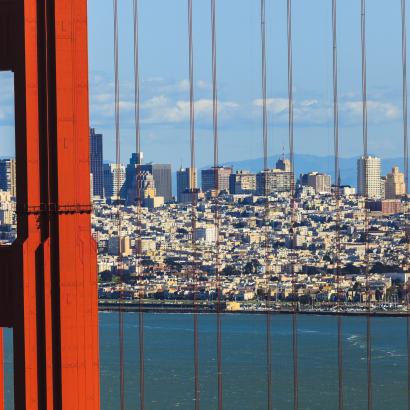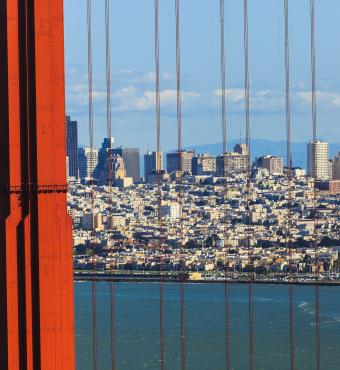- Economics
- US Labor Market
- Politics, Institutions, and Public Opinion
- State & Local
- California
“Just opening your business, the amount of red tape . . . it puts the Soviet Union to shame. . . . Often times you’re hundreds and hundreds of thousands dollars in debt because of delays that were caused by the city and their processes.”
This is how Ben Bleiman, a small-business owner in San Francisco, described the expense and time involved in opening a small business in San Francisco in 2019. And small-business nightmares don’t end once you have opened your doors. Keeping the business open means paying extraordinary taxes and fees, including a requirement that business owners fund every worker’s health insurance at a cost of two dollars an hour, even if workers are covered by the insurance of their parents.
And so in 2019, Bleiman and 200 other signatories made up of other small-business owners and advocacy groups sent a letter to the city’s Board of Supervisors, asking to work together to increase efficiency and reduce the costs of opening and maintaining a small business.
What resulted was a new law (Proposition H) that promised a streamlined approval process for small businesses. This is a needed change, but one that hasn’t helped much thus far. Only two applications for streamlined approval have been approved. You see, you first need to get approved to get approved. Somewhere, Rube Goldberg is smiling.
Proposition H should be applied retroactively to help those who have been struggling for years to open a business. If it were, then Jason Yu, a 30-year-old San Franciscan whose dream was to open an ice cream shop, might be scooping exotically flavored frozen delights as we speak. Jason spent $200,000 and two years trying to obtain approval for his shop, which was a small (1,250 square feet), long vacant storefront, painted over with graffiti and with trash piling up on its doorstep.
Yu, the dad of two young children, now has an enormous debt to pay off. Nothing to show for $200,000 and two years of his life. Welcome to the insanity of opening a small business in San Francisco. And you can count one more entrepreneur who will leave San Francisco. “This became a nightmare project. For sure I will not try to do anything in San Francisco. It just doesn’t make sense,” Yu said.
Sharky Laguana, president of the city’s small-business commission stated, “There’s absolutely no reason it should cost that much to open a business in a place that’s been vacant for that long. It’s outrageous.” Yes, it is outrageous, no two ways about it. But hey, this is San Francisco, where those who live here go down the rabbit hole every day.
Yu submitted plans to the Department of Building Inspection in November 2019. So far so good, but then the plot thickens, as the Planning Department required him to notify neighbors within 50 yards to allow any of them to object to his business idea.
But what is not to like about ice cream? One neighboring business did object. A competing ice cream retailer, one that was selling the same Asian-flavored ice creams as Jason was planning to serve. Before we even talk about why a business should have any say in how someone else’s property is used for appropriately zoned commercial purposes, this complaint should have been dismissed out of hand for the obvious reason of preventing competition. But it wasn’t, so Yu had to lawyer up, adding to his $200,000 tab. San Francisco attorneys are expensive, because, well, living decently in San Francisco is expensive. And the complaint also stopped Yu in his tracks for months.
Yu ultimately prevailed in the war of the ice cream shops, but he then faced reviews and evaluations from another 15 departments. Yes, 15. Because allowing a 1,250-square-foot ice cream shop most definitely needs to have many critical eyes reviewing such a potentially dangerous and unusual business idea. With 15 separate department and agency reviews, you would think Jason was trying to sell used fuel rods from a nuclear power plant.
The review process required a second evaluation from the public health department. Why a second review? Given that public health had no further comments but wanted more money from Yu before giving him their thumbs up, you can draw your own conclusions.
Finally, after roughly two years and $200,000, Yu’s small ice cream shop was permitted. But Yu’s budget was more than spent, as he would need at least another $120,000 in construction costs to remodel the store. Sadly, Jason was done in. And meanwhile, he watched as a cousin was able to open a nail salon in Daly City, just a few miles south of San Francisco. With all of those volatile chemical fumes emanating from nail lacquer and polish remover, who knows how long San Francisco would have taken to permit that business?
I wish this story had a good ending. As in, the city of San Francisco fronted Jason the money he needed to renovate the space so he could open. But it doesn’t. If only every San Francisco supervisor had to spend a week shadowing small-business owners in San Francisco to see what they have to deal with. If only.
What happened to the competing ice cream store? Well, you know what they say about karma. The competitor is now being rightly criticized for trying to block competition. And since the owner of the competitor is not Asian, she is also being criticized for appropriating Asian culture by selling Asian-flavored ice cream. Yes, somewhere, Rube Goldberg is indeed smiling.
















